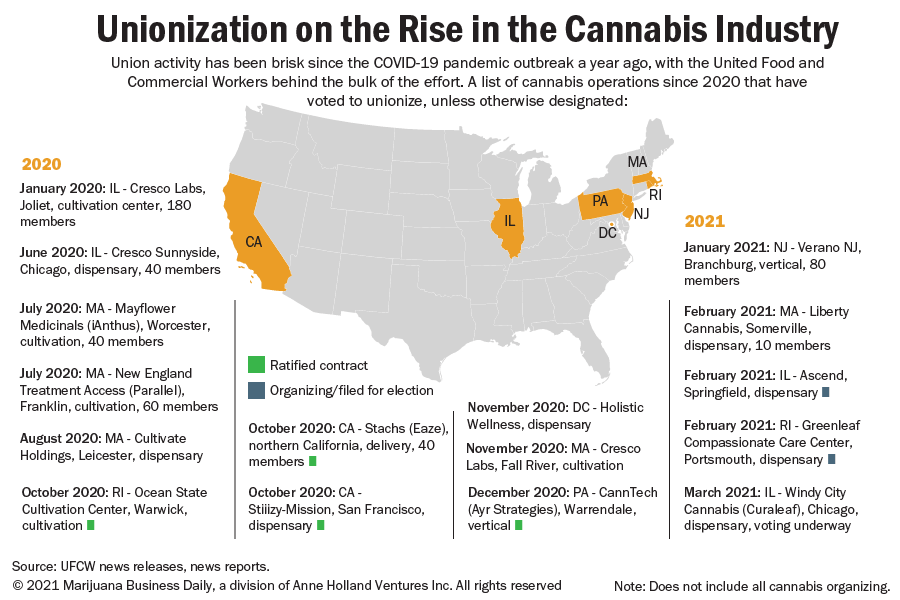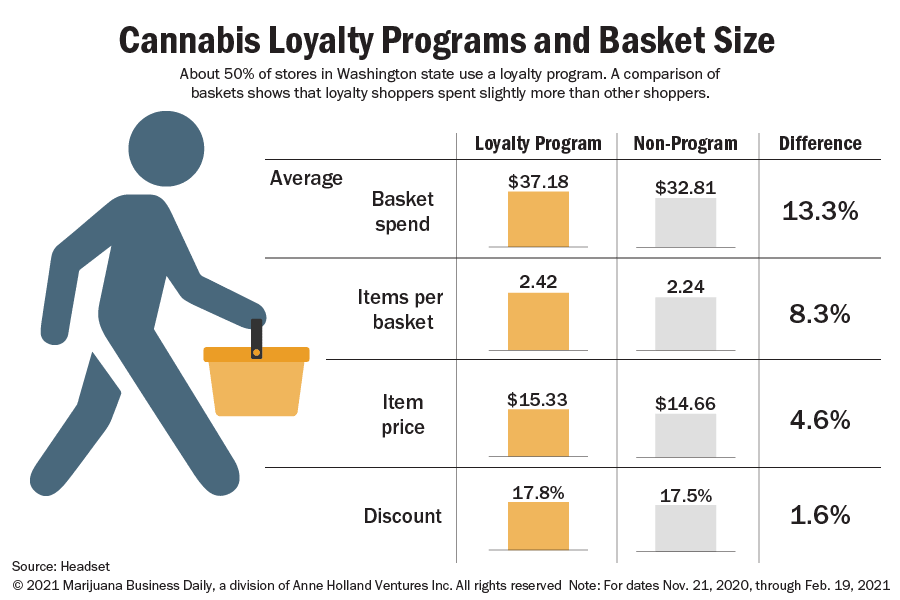Union organizing in the marijuana industry has been on the upswing in the past year amid the coronavirus pandemic, particularly in new and emerging adult-use markets such as Illinois, Massachusetts and New Jersey.
Several factors are in play, according to union officials and labor experts:
- The pandemic increased employee anxiety and concerns about workplace health and safety, opening the window for union organizing.
- More states are mandating labor peace agreements that prohibit employers from interfering with labor organizing. Labor peace pacts are more likely to lead to unionized workplaces over time.
- Unions are being more aggressive in targeting the nascent cannabis industry as they see membership decline in other economic sectors.
The United Food and Commercial Workers International Union (UFCW) is by far the most dominant union involved in the cannabis industry.
New Jersey Gov. Phil Murphy even appointed a UFCW official to the state’s new Cannabis Regulatory Commission, underscoring the union’s role in the state’s soon-to-launch adult-use marijuana program.
The UFCW started a formal effort in 2013 called Cannabis Workers Rising to organize employees in the marijuana and hemp industries, which offer greater growth opportunities versus mainstream businesses such as grocery chains and retailers.
“Unions view cannabis as a huge opportunity,” Boston labor attorney Jonathan Keselenko recently told Marijuana Business Magazine.
“They have been making sort of a full-court press to get the industry organized.”
Hugh Giordano, a union representative/organizer for Local 152 of the UFCW in New Jersey, said it might sound corny but he believes the cannabis industry offers a “historic opportunity for industry and labor” to forge a partnership that ensures fair wages and benefits and helps in recruiting and retaining highly skilled workers.
But company officials and legal experts such as Keselenko say there are potential downsides as well.
They say that unionized workplaces are more costly and reduce a company’s flexibility, such as the ability to shift employees to other work assignments based on current needs.
They also warn companies about being careful when signing labor peace provisions and not go beyond what is necessary to meet the requirement.
Some legal experts argue that labor peace provisions are unnecessary altogether because the same worker protections are provided under federal labor laws.
While many marijuana operators such as Minneapolis-based Vireo Health and the recently sold Seattle-based Have a Heart have been open to unionization, there also is evidence of conflict between companies and union organizers.
The UFCW, for example, has butted heads with Massachusetts-based Curaleaf, one of the country’s largest marijuana companies, in Arizona, Massachusetts and New York, according to National Labor Relations Board (NLRB) filings.
A mail-in union election currently is underway at Curaleaf’s Windy City dispensary in Chicago.
Curaleaf declined to comment for this story.
Union presence felt in Northeast, Midwest
On its national website, the UFCW says it represents “tens of thousands of cannabis workers” across multiple states.
Those numbers couldn’t be verified, and the national UFCW hasn’t responded to Marijuana Business Daily queries seeking specific cannabis-industry data.
But the activity has been brisk in the past year or so.
The chart above – drawn from news releases and media reports – isn’t a complete list of all the union activity that has gone on in the marijuana sector in the past year.
But it offers a snapshot of the UFCW’s organizing efforts.
Union activity is more pronounced in states where labor traditionally has had a large presence, such as California, the Northeast and parts of the Midwest.
Edmund DeVeaux, president of the New Jersey CannaBusiness Association, said the UFCW is a member of the trade association.
“As far as our relationship with the UFCW, DeVeaux said, we are on the same page” with respect to advocating for a safe workplace that provides fair wages and benefits, economic parity, opportunities and training.
“It’s not that a nonunion shop couldn’t achieve it, but that’s something they (UFCW) embrace,” he added.
“Why would we not support it?”
Pandemic-fueled unionizing
The COVID-19 pandemic is one reason the UFCW has made inroads in the past year.
“It woke up the worker side,” Giordano said of UFCW Local 152.
An employee at the Curaleaf dispensary in Hanover, Massachusetts, told Marijuana Business Daily last spring that workers had previously thought about unionizing but efforts became serious as COVID-19 became widespread.
The employee said at the time that schedules remained essentially the same with little recognition of the elevated risks. The workers wanted more recognition and input into company decisions.
Curaleaf requested an indefinite postponement of a union election at the Hanover dispensary because of the pandemic, but the NLRB ordered a mail-in election, according to an NLRB ruling last May.
The results are still uncertain, particularly because of a dispute over the ballots of six Curaleaf workers who were temporarily transferred to Hanover during Massachusetts’ shutdown of adult-use sales in April and May 2020.
A NLRB hearing officer agreed with the UFCW that those ballots against unionizing shouldn’t be counted, according to a union official.
Curaleaf appealed to the regional NLRB director, who ruled in UFCW’s favor. Curaleaf has now appealed to the NLRB in Washington DC.
The UFCW hasn’t been successful in all of its organizing activities.
In some cases, petitions for union elections were withdrawn.
In Massachusetts, workers at a New England Treatment Access (NETA) dispensary in Brookline soundly rejected the union by a 30-9 vote. But the UFCW said the employees were coerced and has appealed to the NLRB.
Labor peace can lead to unionization
Labor peace requirements are another factor in the increase in marijuana unionization.
California enacted a stricter labor peace provision in 2019 requiring applicants with 20 or more employees to provide a notarized statement that they will enter into and abide by the terms of a labor peace agreement.
Jim Araby, director of strategic campaigns for UFCW Local 5 in Northern California, said compliance is inconsistent.
“I would say most major retailers and delivery operators are complying,” Araby wrote in an email to MJBizDaily. “Less so in the testing, manufacturing and cultivation sectors.”
Labor peace provisions also are likely as more Northeast states legalize adult-use marijuana.
New Jersey’s new adult-use marijuana law requires labor peace agreements, except in the case of microbusinesses.
The UFCW has urged other Northeast governors to put labor peace pacts into adult-use cannabis bills.
“If you’re going to talk about social equity, you need to talk about workers,” Giordano said.
“We know New Jersey is going to be a powerhouse when it comes to cannabis. So why wouldn’t we want the best and brightest, and the only way to attract the best and brightest is to have good wages and benefits.”
Giordano said many marijuana companies are open to the possibility of unionization.
“But, like any industry, there are those that fight tooth and nail.”
Jeff Smith can be reached at jeff.smith@mjbizdaily.com.
Omar Sacirbey contributed to this report.







